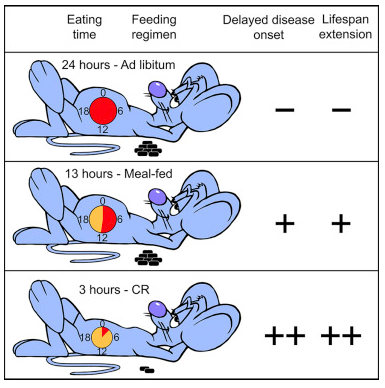Mitchell et al. show (in mice) that caloric restriction (a 30% reduction in daily intake) or single-meal feeding (resulting in fasting during each day but no caloric restriction) increases life span and delays the onset of age-associated liver pathologies in mice, compared with no feeding restrictions. This suggests that daily fasting, even without caloric restriction, may improve health span in humans.
The importance of dietary composition and feeding patterns in aging remains largely unexplored, but was implicated recently in two prominent nonhuman primate studies. Here, we directly compare in mice the two diets used in the primate studies focusing on three paradigms: ad libitum (AL), 30% calorie restriction (CR), and single-meal feeding (MF), which accounts for differences in energy density and caloric intake consumed by the AL mice. MF and CR regimes enhanced longevity regardless of diet composition, which alone had no significant impact within feeding regimens. Like CR animals, MF mice ate quickly, imposing periods of extended daily fasting on themselves that produced significant improvements in morbidity and mortality compared with AL. These health and survival benefits conferred by periods of extended daily fasting, independent of dietary composition, have major implications for human health and clinical applicability.



